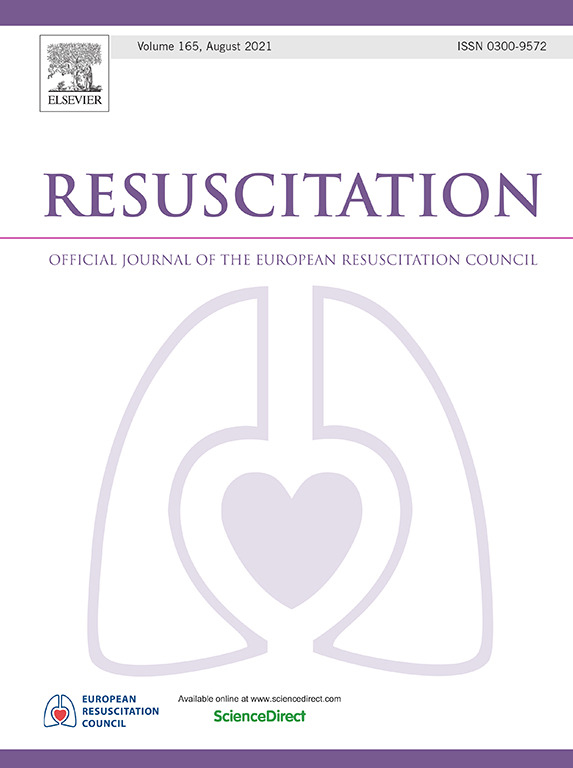Race is not associated with medical emergency team evaluation prior to in-hospital cardiac arrest
IF 6.5
1区 医学
Q1 CRITICAL CARE MEDICINE
引用次数: 0
Abstract
Background
Black patients have worse outcomes after in-hospital cardiac arrest (IHCA). Whether these racial disparities are associated with medical emergency team (MET) evaluation prior to IHCA remains unknown.
Methods
A retrospective cohort study of adults age ≥ 18 years from the American Heart Association Get With The Guidelines® Resuscitation registry who had an IHCA between 2000 and 2021 with acute physiologic decline (modified early warning score [MEWS] ≥ 3) during the 24 h prior to IHCA. A propensity-weighted cohort was constructed to balance confounders between Black and White patients. The association between race and MET evaluation was quantified with weighted multivariable logistic regression.
Results
Among 354,480 patients, 88,507 met the initial inclusion criteria, of which 29,714 patients (median age 69 [IQR 58–79] years, 42.5% female, and 26.9% Black) had acute physiologic decline during the 24 h prior to IHCA. Among patients with acute physiologic decline, 4102 (13.8%) patients had a preceding MET evaluation before IHCA. Rates of MET evaluation prior to cardiac arrest did not differ significantly between Black and White patients with acute physiologic decline (aOR 1.02, 95% CI 0.94–1.11, p = 0.62).
Conclusions
Though racial disparities in IHCA outcomes exist, this study did not detect a difference in rates of MET evaluation prior to IHCA among patients with acute physiologic decline as a potential mechanism for these disparities.
种族与医院内心脏骤停前的医疗急救小组评估无关
背景:黑人患者在院内心脏骤停(IHCA)后的预后较差。这些种族差异是否与医疗急救小组(MET)在IHCA之前的评估有关尚不清楚。方法回顾性队列研究来自美国心脏协会Get With the Guidelines®复苏登记的年龄≥18岁的成年人,这些成年人在2000年至2021年期间发生IHCA,在IHCA发生前24小时内出现急性生理性衰退(修正早期预警评分[MEWS]≥3)。建立一个倾向加权队列来平衡黑人和白人患者之间的混杂因素。种族与MET评价之间的关系用加权多变量逻辑回归进行量化。结果在354,480例患者中,88,507例患者符合初始纳入标准,其中29,714例患者(中位年龄69 [IQR 58-79]岁,42.5%为女性,26.9%为黑人)在IHCA前24小时内出现急性生理性下降。在急性生理性衰退患者中,4102例(13.8%)患者在IHCA前进行过MET评估。急性生理性衰退的黑人和白人患者心脏骤停前MET评估率无显著差异(aOR 1.02, 95% CI 0.94-1.11, p = 0.62)。结论:尽管IHCA结果存在种族差异,但本研究并未发现急性生理性衰退患者在IHCA前MET评估率的差异是造成这些差异的潜在机制。
本文章由计算机程序翻译,如有差异,请以英文原文为准。
求助全文
约1分钟内获得全文
求助全文
来源期刊

Resuscitation
医学-急救医学
CiteScore
12.00
自引率
18.50%
发文量
556
审稿时长
21 days
期刊介绍:
Resuscitation is a monthly international and interdisciplinary medical journal. The papers published deal with the aetiology, pathophysiology and prevention of cardiac arrest, resuscitation training, clinical resuscitation, and experimental resuscitation research, although papers relating to animal studies will be published only if they are of exceptional interest and related directly to clinical cardiopulmonary resuscitation. Papers relating to trauma are published occasionally but the majority of these concern traumatic cardiac arrest.
 求助内容:
求助内容: 应助结果提醒方式:
应助结果提醒方式:


